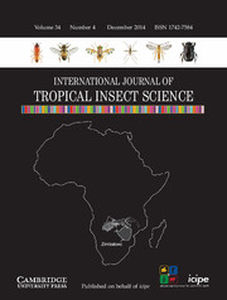Among the top 10 insects that have been featured in this Journal, a good number are infectious disease vectors such as mosquitoes, sandflies, tsetse flies and blackflies. Bliziotis et al. (Reference Bliziotis, Paraschakis, Vergidis, Karavasiou and Falagas2005) show a gradual increase in the worldwide trends in the quantity and quality of published articles on infectious diseases. The authors present a reassuring trend that in this field, the developing world achieves a higher rate of increase in research productivity than the developed world, mainly due to increased awareness and improved infrastructure supporting research and development on infectious diseases.
In this issue, we cover one such disease, onchocerciasis (commonly known as river blindness), that is second in the world as an infectious cause of blindness. The causative agent is the Onchocerca volvulus filarial worm, transmitted by blackflies of the Simulium damnosum sensu lato group. The worms cause eye inflammation, bleeding and other complications that ultimately lead to blindness. Fertile riverside areas, the main habitat of blackflies, often remain uninhabited for fear of infection.
Other main topics in this issue include the tea insect fauna, pollinators, stored product pests, fruit flies and biological control agents like parasitoids.
A recent preliminary analysis of submissions to our Journal shows increasing contributions from Latin America and Asia, complementing the Journal's strong author base in Africa, a trend that we believe is very positive. Thus I encourage all of you to continue sending your manuscripts to the International Journal of Tropical Insect Science, as we continue striving to become the reference journal for tropical entomology.
As always, I would like to thank the Journal's Regional Editors, the Editorial Board, our Journal Secretariat staff and, of course, Cambridge University Press for their dedicated contributions in the development of the Journal.


